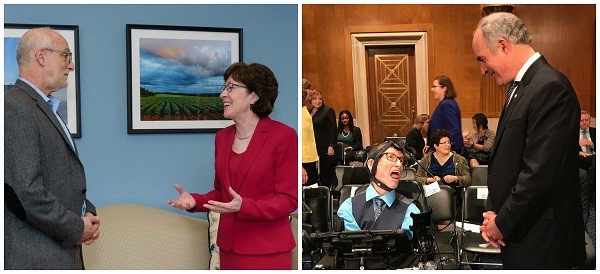Senate Aging Committee Examines the Mental and Physical Effects of Social Isolation and Loneliness
The physical outcomes of this rapidly growing public health issue have been compared to smoking, obesity, and cancer
Prolonged isolation is comparable to smoking 15 cigarettes a day
Click HERE to read Senator Collins’ opening statement
Click HERE to read Senator Casey’s opening statement

Click HERE for a high resolution photo of Senator Collins with Dr. Lenard Kaye of Bangor, ME
Click HERE for a high-resolution photo of Senator Casey with Richard Creech of Harrisburg, PA
Washington, D.C. — U.S. Senators Susan Collins and Bob Casey, the Chairman and Ranking Member of the Senate Aging Committee, held a hearing today titled, “Aging Without Community: the Consequences of Isolation and Loneliness.”
“The consequences of isolation and loneliness are severe: negative health outcomes, higher health care costs, and even death. The root problem is one that we can solve by helping seniors keep connected with communities,” said Senator Collins. “Just as we did when we made a national commitment to cut smoking rates in this country, we should explore approaches to reducing isolation and loneliness. Each has a real impact on the health and well-being of our seniors.”
“Older Americans are vital to the prosperity and well-being of our nation,” Senator Casey said. “Our work on the Aging Committee to ensure that we all remain connected to community as we age is important to maintaining that vitality. It is for that reason that we, as a federal government, need to sustain and improve our investments in programs that help seniors stay connected -- from Meals on Wheels to rural broadband to transportation services.”
Today's hearing, the first in a two-part series, examined the mental and physical health effects of social isolation and loneliness. The risks of social isolation and loneliness compare with smoking and alcohol consumption and exceed those associated with physical inactivity and obesity. According to researchers, prolonged isolation is comparable to smoking 15 cigarettes a day. Isolation and loneliness are associated with higher rates of heart disease; weakened immune system; depression and anxiety; dementia, including Alzheimer’s disease; and nursing home admissions.
The U.S. Census reported that 29 percent of persons over the age of 65 live alone, with more than 50 percent of women over the age of 75 living alone. Other studies report that one in five older adults are isolated. While living alone does not necessarily mean that a person is lonely, it can be a risk factor for loneliness or isolation. Older adults with the highest level of loneliness were more than twice as likely to die within six years as those with the lowest level of loneliness.
The hearing also explored programs that reduce social isolation and loneliness and resources and support for older adults at risk.
Witnesses for the hearing included:
- Julianne Holt-Lunstad, PhD, Professor of Psychology, Brigham Young University (Provo, UT)
- Lenard Kaye, DSW, PhD, Professor of Social Work, Director of the Center on Aging, University of Maine (Bangor, ME)
- W. Mark Clark, MSW, President and CEO, Pima Council on Aging, Arizona (Tucson, AZ)
- Richard (Rick) Creech, Educational Consultant, Pennsylvania Training and Technical Assistance Network (Harrisburg, PA)
Click HERE to read their written testimonies.
###